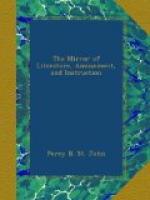Major Andre, you may recollect, was taken prisoner by the Americans during the revolution as a British spy. The house or hut in which he was kept in confinement had only very lately gone into ruins. It was then a tavern, and its landlord, now extremely old, still resides close by, and recites the melancholy tale with much affection and feeling. He witnessed the gentlemanly manners and equanimity of this heroic soldier, while in his house, under the most trying circumstances, and from its threshold to the fatal spot. In his room the prisoner could hear the sound of the axe employed in erecting the scaffold; and on one occasion, in the presence of a friend, when these sounds, terrible to all but himself, were more than usually distinct, he is said to have observed, with great composure, “that every sound he heard from that axe was indeed an important lesson, it taught him how to live and how to die.” When conducted to the place of execution, and on coming near to the scaffold, he made a sudden halt, and momentarily shrunk at the sight; because he had, to the last, entertained hopes that his life would have been taken by the musket, and not by the halter. This apparent want of resolution quickly passed away, and the disappointment he felt told more against the uncompromising spirit of the times than against himself. Rejecting assistance, he approached and ascended the platform with a steady pace and lofty demeanour, and submitted to his fate with the pious resignation of a great and good man. A large concourse of spectators, among whom were several well dressed females, had assembled on this sorrowful occasion; and it is reported that scarcely a dry cheek could be found throughout the whole multitude. Andre was then seen as he always had been, and moved by that which had through life presided over all his actions, resolved beyond presumption, and firm without ostentation.
The person and appearance of Major Andre were prepossessing; he was well proportioned, and above the common size of men; the lines of his face were regular, well marked, and beautifully symmetrical, which gave him an expression of countenance at once dignified and commanding. His address was graceful and easy; in manners he was truly exemplary, and in conversation affable and instructive. Polite to all ranks and classes of people, he was universally respected; fond of discipline, and always alive to the just claims and feelings of others, he was beloved in the army, and generally appealed to as the common arbitrator and conciliator of the contentions of those around him. In a word, he was a sincere friend, a scholar, and accomplished gentleman, a patriot, a gallant soldier, an able commander, and a Christian.




